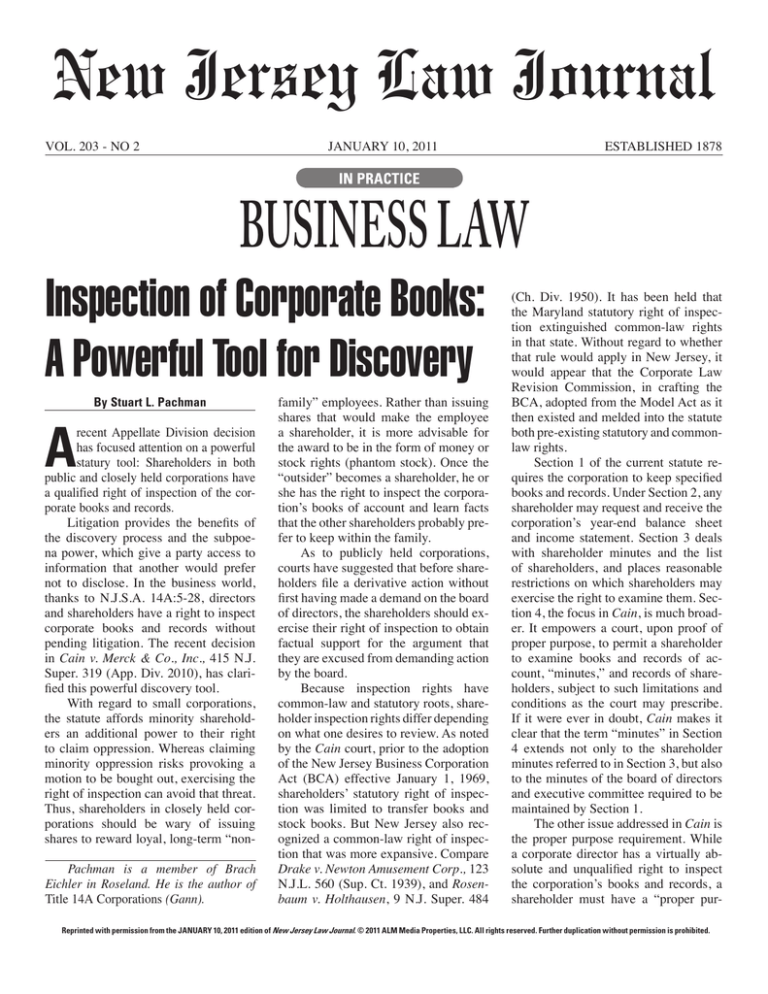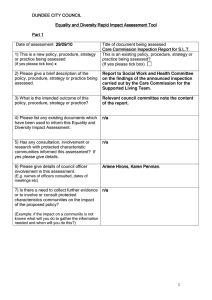
New Jersey Law Journal
VOL. 203 - NO 2
JANUARY 10, 2011
ESTABLISHED 1878
BUSINESS LAW
Inspection of Corporate Books:
A Powerful Tool for Discovery
By Stuart L. Pachman
A
recent Appellate Division decision
has focused attention on a powerful
statury tool: Shareholders in both
public and closely held corporations have
a qualified right of inspection of the corporate books and records.
Litigation provides the benefits of
the discovery process and the subpoena power, which give a party access to
information that another would prefer
not to disclose. In the business world,
thanks to N.J.S.A. 14A:5-28, directors
and shareholders have a right to inspect
corporate books and records without
pending litigation. The recent decision
in Cain v. Merck & Co., Inc., 415 N.J.
Super. 319 (App. Div. 2010), has clarified this powerful discovery tool.
With regard to small corporations,
the statute affords minority shareholders an additional power to their right
to claim oppression. Whereas claiming
minority oppression risks provoking a
motion to be bought out, exercising the
right of inspection can avoid that threat.
Thus, shareholders in closely held corporations should be wary of issuing
shares to reward loyal, long-term “nonPachman is a member of Brach
Eichler in Roseland. He is the author of
Title 14A Corporations (Gann).
family” employees. Rather than issuing
shares that would make the employee
a shareholder, it is more advisable for
the award to be in the form of money or
stock rights (phantom stock). Once the
“outsider” becomes a shareholder, he or
she has the right to inspect the corporation’s books of account and learn facts
that the other shareholders probably prefer to keep within the family.
As to publicly held corporations,
courts have suggested that before shareholders file a derivative action without
first having made a demand on the board
of directors, the shareholders should exercise their right of inspection to obtain
factual support for the argument that
they are excused from demanding action
by the board.
Because inspection rights have
common-law and statutory roots, shareholder inspection rights differ depending
on what one desires to review. As noted
by the Cain court, prior to the adoption
of the New Jersey Business Corporation
Act (BCA) effective January 1, 1969,
shareholders’ statutory right of inspection was limited to transfer books and
stock books. But New Jersey also recognized a common-law right of inspection that was more expansive. Compare
Drake v. Newton Amusement Corp., 123
N.J.L. 560 (Sup. Ct. 1939), and Rosenbaum v. Holthausen, 9 N.J. Super. 484
(Ch. Div. 1950). It has been held that
the Maryland statutory right of inspection extinguished common-law rights
in that state. Without regard to whether
that rule would apply in New Jersey, it
would appear that the Corporate Law
Revision Commission, in crafting the
BCA, adopted from the Model Act as it
then existed and melded into the statute
both pre-existing statutory and commonlaw rights.
Section 1 of the current statute requires the corporation to keep specified
books and records. Under Section 2, any
shareholder may request and receive the
corporation’s year-end balance sheet
and income statement. Section 3 deals
with shareholder minutes and the list
of shareholders, and places reasonable
restrictions on which shareholders may
exercise the right to examine them. Section 4, the focus in Cain, is much broader. It empowers a court, upon proof of
proper purpose, to permit a shareholder
to examine books and records of account, “minutes,” and records of shareholders, subject to such limitations and
conditions as the court may prescribe.
If it were ever in doubt, Cain makes it
clear that the term “minutes” in Section
4 extends not only to the shareholder
minutes referred to in Section 3, but also
to the minutes of the board of directors
and executive committee required to be
maintained by Section 1.
The other issue addressed in Cain is
the proper purpose requirement. While
a corporate director has a virtually absolute and unqualified right to inspect
the corporation’s books and records, a
shareholder must have a “proper pur-
Reprinted with permission from the JANUARY 10, 2011 edition of New Jersey Law Journal. © 2011 ALM Media Properties, LLC. All rights reserved. Further duplication without permission is prohibited.
2
NEW JERSEY LAW JOURNAL, JANUARY 10, 2011
pose” to do so.
When a shareholder seeks to examine only shareholder minutes and the record of shareholders under Section 3, the
corporation bears the burden of showing
that the shareholder has an improper purpose. Under Section 4, however, to gain
access to the wider scope of documents,
including books and records of account,
the burden of proof of a proper purpose is
on the shareholder.
Inspection rights under the statute
are narrower than litigation discovery
afforded under the Rules of Court. The
inspection must be germane to the claimant’s status as a shareholder and must be
exercised in good faith. Curiosity is not
enough; curiosity enhanced by suspicion
is still insufficient. In determining what
is a proper purpose, the court must weigh
against the desire (concern) of minority shareholders to “know what is going
on” the fact that inspection of a corporation’s books may adversely affect other
shareholders and the corporation. The
shareholder cannot simply cry “mismanagement.” He or she must produce some
evidence, not to prove mismanagement,
but to establish a credible basis to support a claim that further investigation is
warranted. An August 2010 decision of
the Supreme Court of Delaware denying
inspection rights appears to take that concept to the limit.
Among purposes that have been determined to be proper are: to facilitate
communication with other shareholders concerning a pending tender offer;
to determine the value of one’s shares;
to determine the corporation’s financial
condition, correctness of a dividend, or
facts involving management conduct;
to determine the corporation’s ability to
pay dividends; and to become informed
about a transaction that requires a shareholder vote. If it is likely that the interests
of all shareholders will be served by the
investigation, it is more likely that the
right to inspect will be granted. In addition to a proper purpose, the shareholder’s demand must be reasonable. A Louisiana court, although granting access to
ledgers, record books and tax returns,
found the demand to review the original
of every cancelled check, deposit slip
and invoice to be unreasonable. In Cain,
the court limited the scope of inspection
to documents generated within a certain
time period pertinent to the main claim in
the federal action.
Improper purposes have been found
to be seeking to discover secrets for a
competitor; gaining knowledge for one’s
own personal business, politics or social
programs; and harassment.
An issue not reached in Cain is
whether seeking facts to support a previously filed derivative action is a proper
purpose. There are benefits to being lead
plaintiff and lead counsel in a derivative action. This causes some corporate
shareholders (or their counsel) to race to
be the first to file. As a result the derivative claim, which belongs to the corporation, is filed without demand first having
been made on the corporation’s board of
203 N.J.L.J. 106
directors to bring the action, and without
a sufficient showing to excuse the demand requirement. Discovery is generally not permitted to support allegations
of demand futility. Thus, after a motion
to dismiss for failure to make demand is
filed, the plaintiff seeks to exercise the
shareholder’s right of inspection to obtain facts to support the allegation that
demand should be excused. The question
presented is whether the “horse” of inspection should follow the “cart” of filing
or, stated differently, whether the winner
of the race to the courthouse has stated a
“proper purpose.”
In May 2010, Vice Chancellor Strine,
in the Delaware Court of Chancery, concluded in no uncertain terms that a stockholder lacks a proper purpose when he
seeks to inspect corporate records to
obtain material to excuse his failure, in
his previously filed derivative action, to
make demand on the corporation’s board
of directors. Citing public policy reasons,
the respected Vice Chancellor refused access to the corporate records, finding that
the right to inspect should not be used
“to rescue [the derivative plaintiff] from
his own self-interested premature rush to
file.”
The Cain court was advised of the
Delaware decision after it had heard oral
argument. It did not address the issue because it had not been briefed. It will be
interesting to see whether the Delaware
decision will remain the rule in Delaware, and whether it will be followed in
New Jersey.






